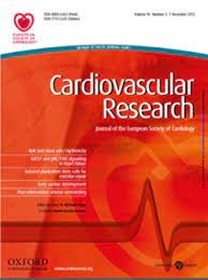Gene therapy in cardiac and vascular diseases: a review of approaches to treat genetic and common cardiovascular diseases with novel gene-based therapeutics
IF 13.3
1区 医学
Q1 CARDIAC & CARDIOVASCULAR SYSTEMS
引用次数: 0
Abstract
In the past decade, there has been substantive progress in gene therapy across disease indications. However, despite multiple gene therapies being approved for clinical use, none have a cardiovascular indication. Several reasons for this have inhibited or delayed progress in the cardiovascular field. First, developing cardiovascular gene therapeutics represents a substantial technical challenge, particularly relating to identifying and building effective delivery systems for therapeutic cargo that will be sufficient to gain meaningful efficacy with acceptable safety for the patient. Second, for genetic disease, gene editing therapy of pathogenic variants is at a relatively early stage of development. Third, since this is a field in development, the optimal design of clinical trials of cardiovascular gene therapies is also evolving and requires expert attention. Despite this, recent and current clinical trials are charting new ground, gaining valuable new patient-focused information that provides critical new learning and bench-to-bedside iterative development that has been so successful in other disease areas. While most clinical trials currently focus on cardiac gene therapy, vascular approaches are being developed, both genetic and common. We herein review the state-of-the-art in this rapidly progressing field of study. We consider gene therapy vector design, including transcriptional control, an area of incredible opportunity through engineering biology approaches to design, build, and test bespoke transcriptional units for expression of therapeutic cargo. Achieving progress in this exciting field will require close working between all stakeholders, including academic, clinical, industry, regulatory, and patient communities. Based on current progress, there is a 10-year horizon for bringing several cardiovascular gene therapies to licensing.心脏和血管疾病的基因治疗:用新的基因疗法治疗遗传性和常见心血管疾病的方法综述
在过去的十年中,基因治疗在疾病适应症方面取得了实质性进展。然而,尽管多种基因疗法已被批准用于临床,但没有一种具有心血管适应症。有几个原因抑制或延迟了心血管领域的进展。首先,开发心血管基因疗法是一项重大的技术挑战,特别是在确定和建立有效的治疗货物递送系统方面,该系统将足以获得有意义的疗效,并为患者提供可接受的安全性。第二,对于遗传性疾病,致病变异的基因编辑治疗还处于相对早期的发展阶段。第三,由于这是一个发展中的领域,心血管基因治疗临床试验的优化设计也在不断发展,需要专家的关注。尽管如此,最近和当前的临床试验正在开辟新的领域,获得有价值的以患者为中心的新信息,提供关键的新学习和在其他疾病领域如此成功的从实验室到床边的迭代开发。虽然目前大多数临床试验都集中在心脏基因治疗上,但血管治疗方法正在开发,包括遗传和普通的。我们在此回顾这一快速发展的研究领域的最新进展。我们认为基因治疗载体设计,包括转录控制,是通过工程生物学方法设计、构建和测试用于表达治疗货物的定制转录单位的一个令人难以置信的机会领域。在这一激动人心的领域取得进展需要所有利益相关者之间的密切合作,包括学术、临床、行业、监管和患者社区。根据目前的进展,将几种心血管基因疗法引入许可的时间为10年。
本文章由计算机程序翻译,如有差异,请以英文原文为准。
求助全文
约1分钟内获得全文
求助全文
来源期刊

Cardiovascular Research
医学-心血管系统
CiteScore
21.50
自引率
3.70%
发文量
547
审稿时长
1 months
期刊介绍:
Cardiovascular Research
Journal Overview:
International journal of the European Society of Cardiology
Focuses on basic and translational research in cardiology and cardiovascular biology
Aims to enhance insight into cardiovascular disease mechanisms and innovation prospects
Submission Criteria:
Welcomes papers covering molecular, sub-cellular, cellular, organ, and organism levels
Accepts clinical proof-of-concept and translational studies
Manuscripts expected to provide significant contribution to cardiovascular biology and diseases
 求助内容:
求助内容: 应助结果提醒方式:
应助结果提醒方式:


